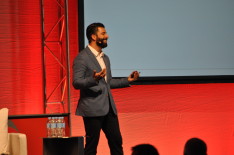Buzzfeed: You can be harsher with Aussie audiences than in the US
Australian’s are more direct and harsher in their attitudes when it comes to news consumption according to Buzzfeed’s director of international strategy.
BuzzFeed’s Keith Hernandez told an audience at today’s Mumbrella 360 conference during his keynote address on “The Buzz on the New Digital Model” that Australians would allow harsher treatment of news subjects, were focussed on local content and that social video was the start of a new “golden age” for online advertising.
“What works really well is the locally relevant content,” he said in Sydney this morning.
“We also found in Australia we can be more direct with our humour as opposed to our ‘no haters’ attitude in the US,” said Hernandez.
“In this market we can be more upfront and direct with the conversation”.
Just a few months after launching their Australian operation Hernandez said such differences were very apparent.
The company has been careful to avoid assumptions about what would work in the Australian and Asian markets accoridng to Hernandez, who described the strategy as start small then through trial and error find what works with an audience and grow the team as the audience did.
“When we left the US we weren’t sure what we did was going to translate to other markets.”
“You can’t just translate a story and hope it works,” he said.
Stories created specifically for the Australian market such as the 37 Signs You Grew Up in Australia in them 90s had been successful locally but and also performed well with overseas audiences as well.
“You have to be locally relevant to your audience, locally relevant but globally consistent,” he told the audience.
“One thing we found in the UK is they don’t care about nostalgia they don’t want to talk about the past, unlike the US.”
BuzzFeed has arrived in the Australian market alongside a host of other international competitors including The Daily Mail Australia, The Guardian Australia as well as local sites that have appeared in the last 12 months.
Hernandez said the company was still testing the waters to see what worked in Australia but the recent addition of a breaking news editor to the local team was a good sign they were getting it right.
“A lot of competitors moved out at the same time. The Notion of a foreign bureau – a lot of companies come here to find news for the homeland,” he said.
“We started to think like a technologist when moved to Australia. We want to be data driven and make sure what we know in the us will work here
Our strategy was to launch with three full time editors we are looking at adding as we grow the audience and just added a breaking news editor
The importance of social over the ttraditional homepage
Hernadez talked at length about how important social media and the shareability of its contents as to growing it’s audience, saying you might get loyal fans returning to the homepage but that new audiences needed to have content taken to them.
“Social is both local and global – our writers think about content that is exciting for a local audience but can also be pushed out to the global audience,” he said.
“The homepage is not as important, our true homepage is your Facebook or Twitter feeds.”
According to Hernandez 75 per cent of BuzzFeed’s traffic comes from social networking sites and sharing
“When building out the story what you have to ask is how is it relevant to that audience who are thinking ‘If the news is relevant it will get to me’.”
Golden age of adverting on social video and mobile content the future
Hernandez revealed that almost 60 per cent of visits were coming from mobile devices, meaning content created without mobile in mind was going to fail.
“We want to create content that will fit into that environment,” he said.
“We noticed in North America where the majority of mobile subscribers are coming from is Asia as well – so for most people the mobile device is the starting point and when we build stories we think of mobile as the starting device.
“If it won’t get shared on mobile it won’t get shared. As we develop we really have to think about mobile”
He also emphasised the importance of video saying the company was pushing what he called “social video” that would get shared and that partnerships with brands were working in this apace.
“Video can be social when you form an emotional connection, 100,ooo is more important than 1 million page views for a brand.
“Nobody wants to be friends with brands so don’t try to be their pal,” he said. “Give them a great story then get out of the way; start a conversation, don’t try to be the conversation.
“Be human – we forget the content we are making is for humans, so always use the litmus test would I share this myself and be personally invested in?”
Robert Burton-Bradley




